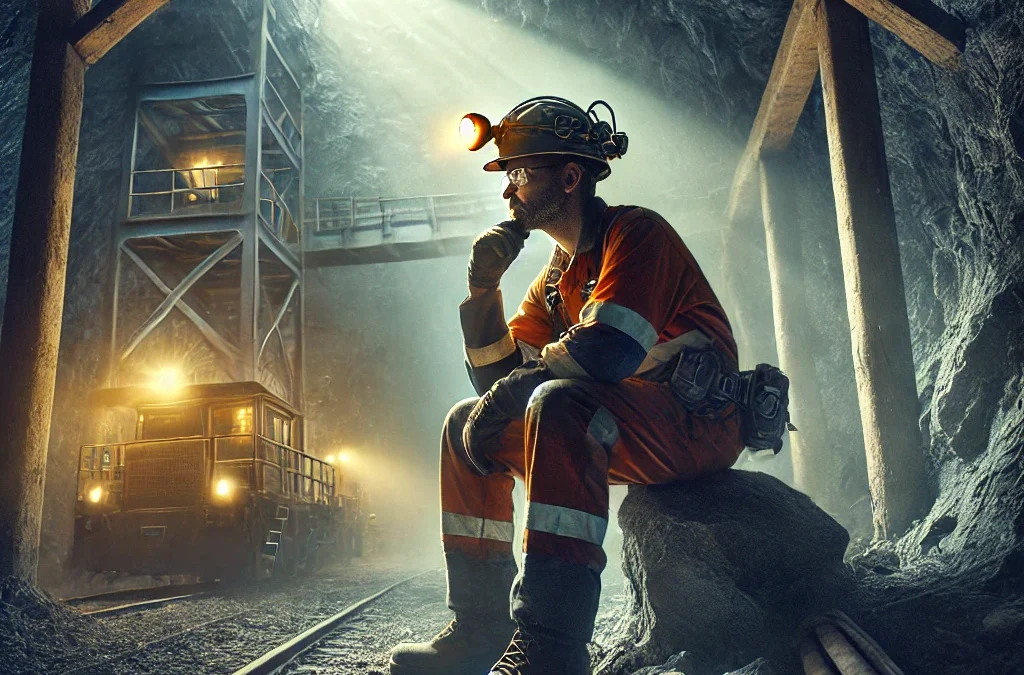Navigating the Depths of Well-being
Underground mining is one of the most physically and mentally demanding professions in the world. With workers spending long hours in confined, often dark spaces far beneath the earth’s surface, the job requires not only physical strength but also immense mental resilience. Yet, the mental health challenges faced by underground miners often go unnoticed, buried beneath a culture of toughness and silence.
In this blog, we’ll explore the unique mental health challenges of underground mining, the impact on workers’ well-being, and practical strategies to foster a healthier mindset for those who work at the frontlines of this industry.
The Mental Health Challenges of Underground Mining
Working in the depths of the earth comes with a unique set of stressors that can take a toll on mental health. Here are some key challenges faced by underground miners:
- Isolation and Confinement
- Spending long hours in dark, enclosed spaces can lead to feelings of isolation and claustrophobia.
- The lack of natural light disrupts circadian rhythms, often resulting in sleep disorders and fatigue.
- High-Risk Environment
- Constant awareness of safety risks, such as cave-ins, equipment malfunctions, and gas leaks, creates chronic stress.
- A culture of hyper-vigilance can lead to anxiety and burnout over time.
- Physical Exhaustion
- The physically demanding nature of the job often leaves miners with little energy to focus on their mental well-being.
- Physical fatigue can exacerbate feelings of frustration, irritability, and emotional withdrawal.
- Shift Work
- Rotating shifts, especially night shifts, disrupt sleep patterns and family life, contributing to loneliness and mood swings.
- Stigma Around Mental Health
- A “toughen up” culture often discourages miners from seeking help or talking about their struggles.
- Many workers fear being judged or labelled as weak if they express mental health concerns.
The Impact on Miners and Their Families
The mental health challenges of underground mining don’t just affect workers – they ripple out to their families and communities. Relationships can become strained as miners struggle to balance the demands of their job with personal responsibilities. Chronic stress and unresolved mental health issues can lead to:
- Increased rates of substance abuse as a coping mechanism.
- Higher risks of depression, anxiety, and even suicidal thoughts.
- Reduced workplace performance and heightened safety risks.
A study by Mining Mental Health in Australia found that underground miners are 1.5 times more likely to experience mental health challenges compared to workers in other industries, highlighting the urgent need for targeted support.
Strategies for Underground Miners to Maintain Mental Health
- Prioritize Physical Health
- Regular exercise and a balanced diet can boost energy levels and improve mood.
- Proper hydration is crucial, especially in the demanding underground environment.
- Build Strong Support Networks
- Stay connected with family and friends, even during long stretches away from home.
- Develop close relationships with colleagues who understand the unique challenges of the job.
- Practice Mindfulness and Relaxation Techniques
- Simple breathing exercises can help manage stress and anxiety during demanding shifts.
- Apps like Calm or Headspace provide accessible mindfulness tools.
- Adopt Healthy Sleep Habits
- Create a consistent sleep schedule, even on days off, to regulate circadian rhythms.
- Use blackout curtains and white noise machines to improve sleep quality.
- Speak Up
- Reach out to supervisors or mental health professionals if stress becomes unmanageable.
- Remember: seeking help is a sign of strength, not weakness.
How Mining Companies Can Support Mental Health
Mining companies play a pivotal role in fostering mental well-being among their workers. Here are some steps organizations can take:
- Provide Mental Health Resources
- Offer access to Employee Assistance Programs (EAP’s) with specialized support for underground workers.
- Provide on-site counselling services and mental health workshops.
- Promote a Culture of Openness
- Train supervisors to recognize signs of mental health challenges and provide support.
- Encourage open conversations about mental health through initiatives like “mental health toolbox talks.”
- Improve Shift Schedules
- Design rosters that allow for adequate rest and recovery between shifts.
- Consider offering flexible work arrangements where possible.
- Invest in Safe and Comfortable Work Environments
- Use technology to improve lighting and ventilation in underground spaces.
- Regularly assess safety protocols to reduce stress related to hazards.
A Brighter Future for Mental Health in Mining
The challenges of underground mining are immense, but so are the opportunities to create a supportive, resilient workforce. By prioritizing mental health, both individuals and organizations can ensure that miners not only survive but thrive in their demanding roles.
Remember, mental health isn’t just about surviving the shifts – it’s about living a balanced and fulfilling life, both above and below ground. Together, we can dig deeper to uncover solutions and build a brighter, healthier future for all those who work in the depths of the earth.

